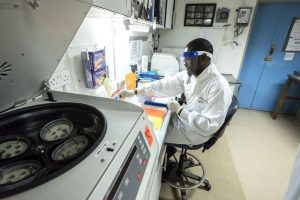University of North Carolina at Chapel Hill was one of four institutions to be awarded a National Cancer Institute D43 grant to strengthen institutional capacity for cancer research in LMIC’s. The 5-year grant strengthens the partnership of the UNC Institute for Global Health and Infectious Diseases and the UNC Lineberger Comprehensive Cancer center and establishes the Malawi Cancer Outcomes Research Program (M-CORP). The research training program will address cancer research needs in Malawi and build scientific expertise and leadership skills to conduct innovative and collaborative cancer research and catalyze a ‘next generation’ of independent Malawian cancer scientists.

The program will leverage numerous networks and engages successful pre-existing Malawi and US training infrastructure and research programs. M-CORP will support investigators who can pursue independent research careers by 1) establishing a robust curriculum and training opportunities across the continuum of cancer outcomes research specific to the Malawian environment and research priorities; 2) supporting advanced degrees; and 3) overcoming obstacles to research independence by providing post-doctoral opportunities including mentored pilot grants. Throughout the program, trainees will have access to an exceptional group of senior mentors, general mentors an faculty.
The program is led by Principal Investigators Lameck Chinula and Yuri Fedoriw and UNC Project Malawi Cancer Program co-Director Tamiwe Tomoka. M-CORP will primarily collaborate with Kamuzu University of Health Sciences (formerly the University of Malawi College of Medicine), administratively coordinated by head of the Department of Biomedical Sciences at College of Medicine, Benjamin Kumwenda. Additional institutional partners include Malawi Ministry of Health, Lighthouse Trust, and Baylor Global HOPE. A Training Advisory Committee comprised of preeminent academics with national and international experience in mentorship and/or administration at UNC or partnering institutions will support the program directors. Outcomes based research training will be provided along one of four methodologic tracks; 1) Patient Reported Outcomes (PRO); 2) Comparative Effectiveness Research and Implementation Science; 3) Clinical Research and Epidemiology; and 4) Laboratory Science.
A well-trained cancer research workforce is essential to address cancer control challenges and realize scientific opportunities in Malawi. We envision this training program to be a foundational initiative for cancer research training in Malawi.